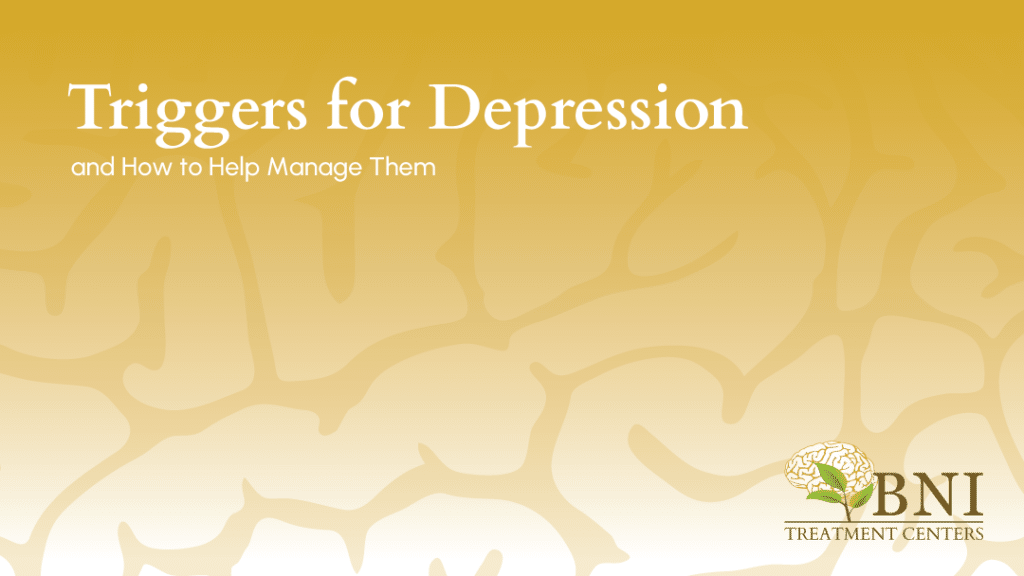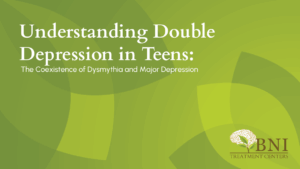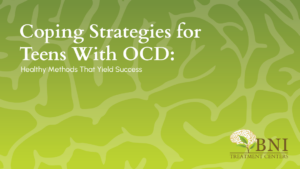
Your teen gets home from school and goes right to bed, sleeping the afternoon away. Lately they’ve withdrawn from their friends and family. They seem sad most of the time. Suddenly, even their eating habits and friend groups have changed.
These are all signs of potential depression in teens.
54% of youth in California reported feeling depressed in a 2022 survey. At BNI Treatment Centers, our team of expert psychiatrists treat teens with depression every day. But what can parents or loved ones do to help teens with depression? In addition to seeking treatment when necessary, education and empathy are critical. In this article, we’ll discuss depression triggers, and how to help your loved one find relief.
What Causes Depression? The Many Factors Involved
Researchers know that certain parts of the brain are smaller in those with depression. However, it’s currently unclear whether these parts of the brain were small before the onset of depression, or if the depression itself made these regions smaller. It’s important to stress that no singular part of the brain is responsible for depression, just as no one psychological factor is responsible.
Depression is more complex than an imbalance of chemicals in the brain, or an issue in a single region. A variety of factors contribute, and scientists are still learning more about its precise causes. Genetic and physical factors are known to make depression more likely, but so does poor physical health, persistent stress, trauma, substance use, or a turbulent upbringing.
All of these collectively increase the likelihood of depression. However, any single one – or even every single one together – does not necessarily mean someone is living with depression.

What Are Triggers for Depression? Defining and Detailing Depression Triggers
A “trigger” is an experience that causes a distressing feeling or memory to resurface. Just like the underlying causes of depression, triggers vary depending on each individual. A certain smell may trigger memories of a traumatic event for one person. A certain sound may trigger another. Objects, people, songs, and sensations can all be triggers for mental distress. This applies to depression as well, with some triggers being more common than others.
It’s important to note that these triggers do not have to be specific – they can be general feelings, or experiences. Grief, physical health, and stress from family or money problems can all be triggers for depression. There are potentially many others.
Grief and Loss
Grief or loss isn’t just about someone passing away. Losing jobs, relationships, or even an opportunity can cause feelings of grief. Importantly, teens experience these emotions just as intensely as any adult. Teens can lose friends, can grieve their neighborhood or home when moving away, and can even feel grief over failing a class. These are all legitimate, painful experiences that can trigger depression.
Grief and depression are different, though, and knowing those differences is important. Grief generally comes in waves of sadness, while depression is a constant experience. Grief that turns into depression dissolves into hopelessness and an inability to function in daily life. It’s a good idea for anyone experiencing a loss, including teens, to work through the feelings surrounding it. This can prevent grief from becoming depression, and if the grief triggered depression, can help the depressed person heal.
Lack of Sleep
Lack of sleep and depression create a vicious cycle. Losing sleep makes depression more likely and can intensify it, but depression can also cause and heighten insomnia. The more this cycle continues, the worse both get.
Treatment for insomnia can help with depression, and getting more sleep should make depression symptoms less severe.
Lack of sleep poses even more of a problem for adolescents than adults. Teens often dislike going to bed early and waking up early for school, yet evidence shows that teens should get 9-10 hours of sleep to properly support their growth. Whether they’re up late studying for a test the next day, or up late trying to relax, their lack of sleep can trigger depressive symptoms.
Money Problems
Financial problems impact adults, but they also take a toll on teens. Studies show that 54% of adolescents feel unprepared to finance their future. In the same study, 69% of teens said rising education costs have affected their plans following high school. Money impacts teens’ futures, and running into financial problems can often trigger uncertainty and depression.
Family Troubles
A turbulent family environment is a common trigger for depression. This can include divorce, frequent fighting, or abuse.
In a survey of 147 teenagers, 28% reported conflict at home. In the same study, 27% percent said they were having problems with their family. Another 27% of teens worried about the health of a family member. This specific survey was conducted in 1996, but teens today continue to worry about their family situations. This ultimately can trigger depression.
Life Transitions
Adjusting to something new can cause stress, which always increases the risk of depression. Moving to a different city, entering or graduating high school, and starting their first job are all examples of life transitions that could trigger depression in teens.
Even positive life transitions can trigger depression. Any change can be a stressor, particularly for young adults and adolescents. Parents may dismiss their child’s concerns when a new transition seems positive, but it’s key to recognize the impact it can still have.
Substance Use
Substance use and depression have a close relationship. Prolonged substance use alters the way neurons in the brain interact with one another, and increases the likelihood of depression.
Several risk factors for depression and substance use disorders also overlap, such as trauma, stress, and genetic disposition. Some individuals with mental health conditions self-medicate with substances to try to ease their symptoms. This relationship can become cyclical. Substance use can be a trigger for depression, and depression can be a trigger for substance use.
Hormonal Changes
There is some evidence that hormone changes during puberty may influence the potential for depression in adolescent girls more than boys. This association may not be due to the hormones themselves, but the social factors that come with puberty, such as girls’ body image and cultural gender roles. The correlation between hormonal changes during puberty and depression in adolescent boys is far less clear.
However, considering the presence of postpartum depression and premenstrual dysphoric disorder (PMDD) in some women, there is reason to think there’s a link between hormonal changes and depression. These hormonal changes may be a depression trigger, but research is still being conducted in this area.
Managing Depression Triggers
While avoiding triggers of depression can be a helpful strategy, sometimes it isn’t possible. Financial problems don’t disappear overnight. A teen having difficulties adjusting to a new home can’t just move back to their previous city to fix things. Instead, individuals need to learn to cope with depression triggers, developing resiliency and other mental skills.
One way to recognize and learn to deal with depression triggers is through therapy. Cognitive behavioral therapy (CBT) focuses on recognizing thought patterns and changing negative ones into more productive ones. This can be helpful for teens with depression triggers.
Regular exercise, good nutrition, and sufficient sleep will make any reactions to depression triggers less severe. Building supportive relationships is beneficial, as is avoiding people who reinforce depression or serve as depression triggers themselves.

Seeking Teen Depression Treatment in Los Angeles
Anyone with depression can benefit from treatment. It’s unrealistic to expect teens to recognize and deal with their depression triggers on their own. Sometimes, even parents’ help is not enough. That’s when it’s time to seek professional depression treatment for your teen.
BNI Treatment Centers is a mental health treatment center for teens ages 12-17 located in the Los Angeles Area. Our facility is small and intimate, and we are dedicated to delivering care to teens on a personal, individualized level. For more on our services, call us at (888) 522-1504.
BNI Treatment Centers: Science-based, evidence-backed, compassion-led.



